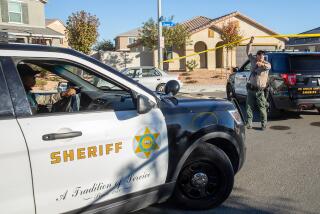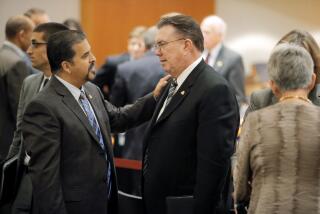Judge upholds Lancaster prayer policy
- Share via
A U.S. District Court ruling that Lancaster may continue its policy of opening council meetings with prayer is being hailed by supporters as an opportunity to foster unity and tolerance in the Antelope Valley city.
Opponents, however, continued to insist that the policy promotes discord, arguing that it is biased toward Christianity. They hope the judgment will be appealed and reversed.
“We think the ruling is wrong,” said Peter Eliasberg, legal director for the American Civil Liberties Union of Southern California, which was not a party to the suit. “By its very nature, when you invoke a specific deity ... it’s divisive, it separates people.”
The ACLU had threatened its own legal action last year after receiving complaints about the city opening meetings “in the name of Jesus,” and making other religious references.
The policy, which started in August 2009, calls for randomly selected clergy from different faiths to deliver the invocation, and does not restrict references to specific religious beliefs.
Lancaster Mayor R. Rex Parris said the judgment handed down July 11 upholds citizens’ rights to freedom of speech and to pray how they want to pray.
“It’s a victory for the nation ... not just for Lancaster,” Parris said of the decision.
Supporters of the policy have argued that allowing people of diverse faiths to pray as they please helps make citizens more aware and tolerant of religions other than their own. In April 2010, Lancaster residents overwhelmingly approved a measure to continue the invocations.
The lawsuit brought by Shelley Rubin, who is Jewish, and Maureen I. Feller, who is Christian, specifically challenged an April 2010 invocation in which the speaker prayed to Jesus Christ.
The plaintiffs, who could not be reached for comment, also charged in court documents that “a substantial majority” of the invocations delivered before meetings were “Christian in nature.”
In his ruling last week, U.S. District Judge Dale S. Fischer said the plaintiffs failed to prove that either the policy or the April 2010 invocation named in the suit violated the constitutional separation of church and state.
Since Lancaster adopted its prayer policy, 20 invocations have been given by Christians, and each included a reference to Jesus, according to court documents. Four invocations were delivered by a metaphysicist; one by a Sikh; and one by a Muslim.
Parris acknowledged it was likely that people from Christian denominations would deliver the invocation more often than others because Lancaster is a predominately Christian community. But the mayor insisted that the city clerk sends invitations to all religious congregations in Lancaster’s database. And, according to court records, Parris has encouraged “a lot of religious leaders, including Sikhs, rabbis and Muslims, to sign up for it.”
That has not swayed some opponents.
“I think the court’s decision is wrong,” said Kamal Al-Khatib, president of the American Islamic Institute of Antelope Valley. He hoped the decision would be appealed and overturned, arguing that Lancaster’s invocation policy promotes an unconstitutional alliance between church and state.
“It makes people from other religions [feel] alienated,” he said of the policy. “The laws being made as pro-Christian laws create a sense of not belonging to that community if you are not Christian.”
Al-Khatib said that Muslims have generally felt welcome in the Antelope Valley, but that comments made by Parris and other city officials in recent months had ignited some religious tensions.
Last year, for example, Councilwoman Sherry Marquez posted anti-Islamic comments on her Facebook page; and during his State of the City address, Parris told an audience of mostly Christian ministers that he was “growing a Christian community.”
Marquez later apologized and Parris said he regretted offending anyone.
But the mayor insisted last week that he has “never faltered from wanting to grow a Christian community ... where we love our neighbors and take care of our neighbors, regardless of religion, race or anything else.”
--
More to Read
Sign up for Essential California
The most important California stories and recommendations in your inbox every morning.
You may occasionally receive promotional content from the Los Angeles Times.











